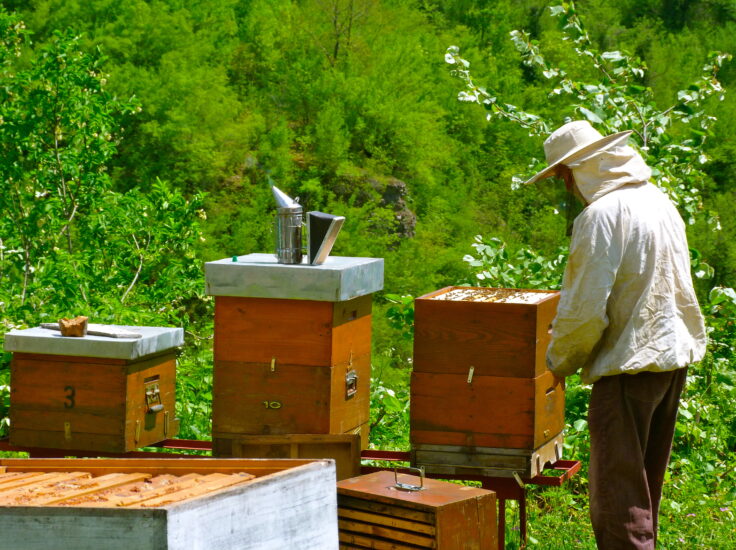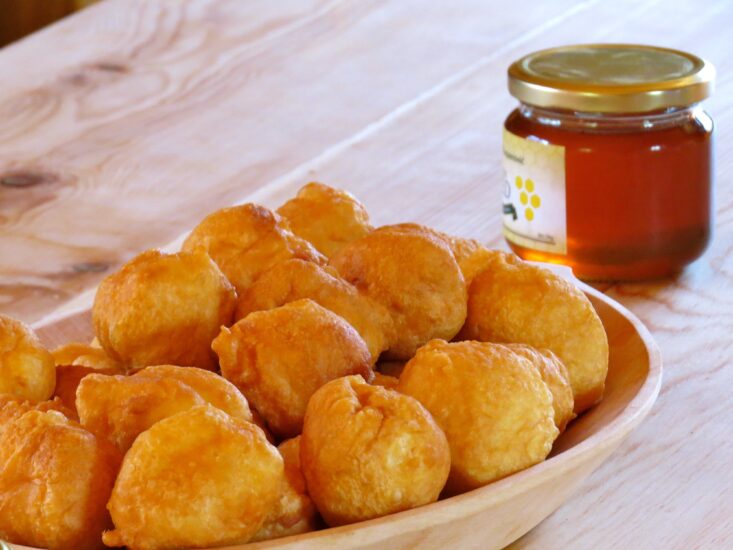A Bee-utiful Experience

Posted on Sun 8 Aug 2021 · by Ilija Dujovic
In the picturesque town of Kolasin, Montenegro, at precisely 1000 metres altitude, there is a house with an orchard. Passing right next to it is a small stream with plenty of fish. An oasis of self-sustainability and peace, but nothing out of ordinary for north of Montenegro.
Meet the King Bee

Velibor caring for the beehives.
The key ingredient, however, is around the one hundred beehives at the end of the property. And as Velibor Scepanovic, the owner of the house, will gladly explain, this makes all the difference. The fruit from his orchard is sweeter, bigger, and more plentiful than at an ordinary orchard. All thanks to the bees. We all know how important the bees are, but we sometimes underestimate their importance. Velibor is there to remind us that without bees it would take only a few years for humankind to run out of food.
Velibor is a lawyer by vocation, but as he will gladly confess, partly in jest, it is much easier and more satisfying working with bees than with humans. His father started the tradition some 50 years ago as a hobby. Thirty years later, Velibor, with the help of his brother, took it to the next level
A health & environment bee-siness
As you put on the protective gear, the first question that pops to mind is how many times he got stung. And he will gladly explain that if you use the protective gear correctly, the answer is never. However, one does need to know exactly how to handle the bees and when to open the beehives. But that’s why Velibor is here. Also, the beekeepers know that unless you are allergic, a bee sting is actually good for your health. Don’t try this at home, but the old remedy for rheumatism in Montenegro was controlled bee stinging. Today’s medicine, and cosmetics, rely heavily on honey, royal jelly, and other bee by-products. Although we are using all these things in medicine, scientists still don’t fully understand exactly how and why everything bees produce is so beneficial for humans, and the planet in general.
What we do know about them is hugely impressive though. Here are a few fun facts
- Bees dance around to communicate the location of the best fields
- Out of 50.000 bees, each recognizes its own beehive by the pheromones released by their Queen
- Bees live on every continent apart from Antarctic
- Contrary to popular belief, bees don’t hibernate and will go out of the hive even on a winter sunny day
- There are at least 10-15 thousand bees in each hive during the winter, going up to 50 to 70 during the spring and summer
- They only live for 4 weeks while they are collecting honey, and up to 6-7 months during the winter when they aren’t.
So come and join us on our Montenegro Experiences to learn many more about the bees, take a photo of the inside of a beehive (say beeees), and of course, taste the local produce. The traditional fritters, ”priganice” with various types of honey, homemade meed, and of course rakija with honey.

Traditional priganice with honey
Read more from our blog here
